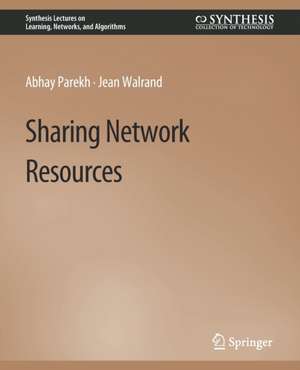Sharing Network Resources: Synthesis Lectures on Learning, Networks, and Algorithms
Autor Abhey Parekh, Jean Walranden Limba Engleză Paperback – 13 mai 2014
Din seria Synthesis Lectures on Learning, Networks, and Algorithms
- 20%
 Preț: 323.00 lei
Preț: 323.00 lei - 20%
 Preț: 638.55 lei
Preț: 638.55 lei - 20%
 Preț: 273.49 lei
Preț: 273.49 lei - 20%
 Preț: 302.41 lei
Preț: 302.41 lei - 20%
 Preț: 336.95 lei
Preț: 336.95 lei - 20%
 Preț: 327.12 lei
Preț: 327.12 lei - 20%
 Preț: 357.06 lei
Preț: 357.06 lei - 20%
 Preț: 355.11 lei
Preț: 355.11 lei - 20%
 Preț: 328.09 lei
Preț: 328.09 lei - 20%
 Preț: 210.63 lei
Preț: 210.63 lei - 20%
 Preț: 273.82 lei
Preț: 273.82 lei - 20%
 Preț: 331.25 lei
Preț: 331.25 lei - 20%
 Preț: 163.24 lei
Preț: 163.24 lei - 20%
 Preț: 173.58 lei
Preț: 173.58 lei - 20%
 Preț: 199.72 lei
Preț: 199.72 lei - 20%
 Preț: 199.72 lei
Preț: 199.72 lei - 20%
 Preț: 417.11 lei
Preț: 417.11 lei - 20%
 Preț: 298.43 lei
Preț: 298.43 lei - 20%
 Preț: 199.72 lei
Preț: 199.72 lei - 20%
 Preț: 227.81 lei
Preț: 227.81 lei - 20%
 Preț: 331.74 lei
Preț: 331.74 lei - 20%
 Preț: 163.24 lei
Preț: 163.24 lei - 20%
 Preț: 226.64 lei
Preț: 226.64 lei - 20%
 Preț: 475.02 lei
Preț: 475.02 lei - 20%
 Preț: 296.47 lei
Preț: 296.47 lei - 20%
 Preț: 314.91 lei
Preț: 314.91 lei - 20%
 Preț: 199.72 lei
Preț: 199.72 lei - 20%
 Preț: 181.10 lei
Preț: 181.10 lei - 20%
 Preț: 224.97 lei
Preț: 224.97 lei - 20%
 Preț: 243.57 lei
Preț: 243.57 lei
Preț: 226.14 lei
Preț vechi: 282.67 lei
-20% Nou
Puncte Express: 339
Preț estimativ în valută:
43.27€ • 46.27$ • 36.08£
43.27€ • 46.27$ • 36.08£
Carte tipărită la comandă
Livrare economică 17 aprilie-01 mai
Preluare comenzi: 021 569.72.76
Specificații
ISBN-13: 9783031792656
ISBN-10: 3031792653
Ilustrații: XVIII, 132 p.
Dimensiuni: 191 x 235 mm
Greutate: 0.27 kg
Editura: Springer International Publishing
Colecția Springer
Seria Synthesis Lectures on Learning, Networks, and Algorithms
Locul publicării:Cham, Switzerland
ISBN-10: 3031792653
Ilustrații: XVIII, 132 p.
Dimensiuni: 191 x 235 mm
Greutate: 0.27 kg
Editura: Springer International Publishing
Colecția Springer
Seria Synthesis Lectures on Learning, Networks, and Algorithms
Locul publicării:Cham, Switzerland
Notă biografică
Abhay Parekh received his Ph.D. in EECS from MIT in 1992. His graduate work was in the area of network resource allocation and papers from his dissertation won the IEEE William Bennett award and the Infocom Best Paper award. After spending time in research at Bell Labs, IBM Thomas J. Watson Research Center, and Sun Microsystems, he cofounded FastForward Networks, which built the first products for application-level multicasting. He has also been on the faculty at the University of California, Berkeley, as an Adjunct Professor of EECS since 2003, where he has worked in areas such as wireless interference management and peer-to-peer networks. In addition to his academic affiliation, Abhay has been a Venture Partner at Accel Partners and the founding CEO of several startup companies.Jean Walrand received his Ph.D. in EECS from UC Berkeley, and has been on the faculty of that department since 1982. He is the author of An Introduction to Queueing Networks (Prentice Hall, 1988) and of Communication Networks: A First Course (2nd ed. McGraw-Hill,1998), and co-author of High-Performance Communication Networks (2nd ed, Morgan Kaufman, 2000) and of Scheduling and Congestion Control for Communication and Processing Networks (Morgan & Claypool, 2010). His research interests include stochastic processes, queuing theory, communication networks, game theory and the economics of the Internet. Prof. Walrand is a Fellow of the Belgian American Education Foundation and of the IEEE, and a recipient of the Lanchester Prize and of the Stephen O. Rice Prize.
